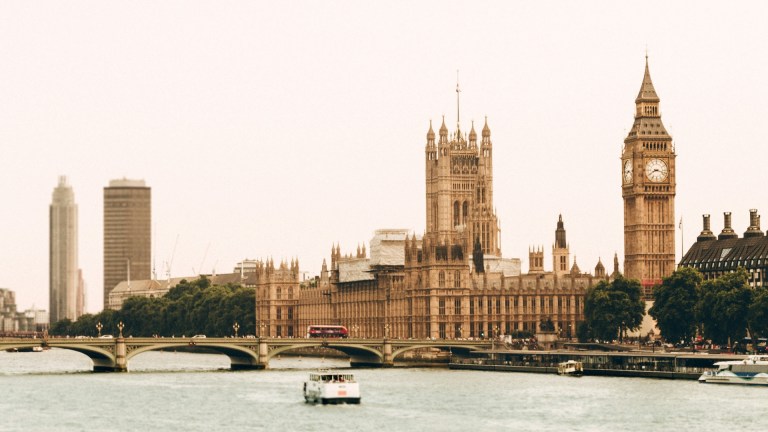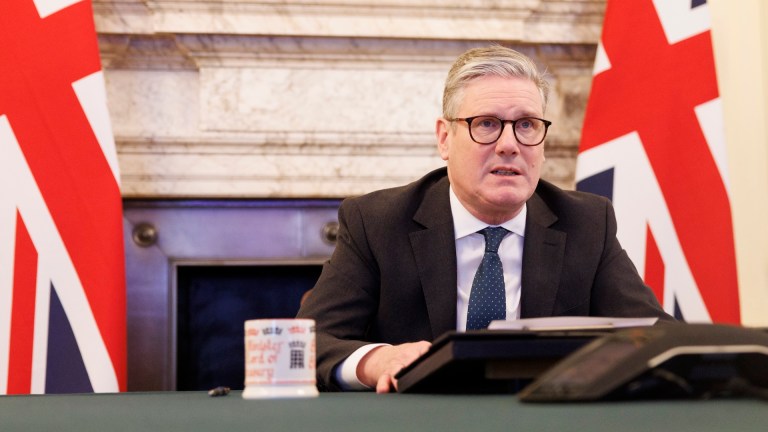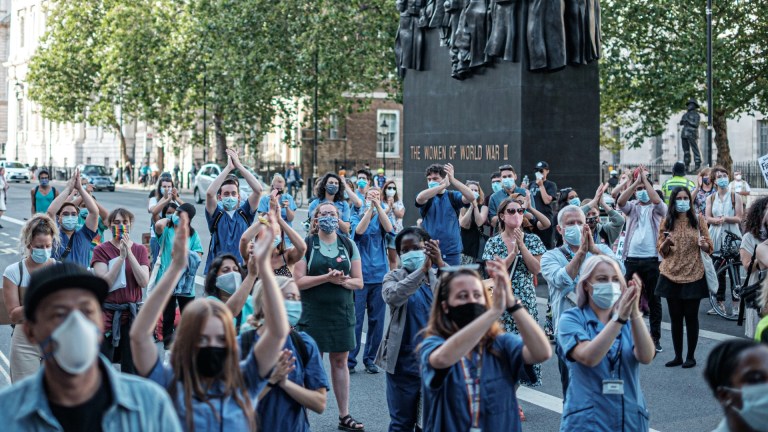Change a Big Issue vendor’s life this Christmas by purchasing a Winter Support Kit. You’ll receive four copies of the magazine and create a brighter future for our vendors through Christmas and beyond.
Dr Silvia Galandini, Oxfam Domestic Poverty Lead, said: “Punishing people who are unable to work with harsher benefits conditionality and sanctions will only push them further into poverty. The government should not penalise those who cannot work as a result of caring responsibilities, disabilities or illness.”
The government announced the plans for stricter benefits sanctions last week, ahead of the Autumn Statement. It comes at a time when benefits claimants are struggling to afford the essentials.
Universal credit and other benefits will be increased by the September rate of inflation of 6.7% in April. The chancellor also opted to unfreeze the local housing allowance to help low-income renters.
But campaigners warn these measures do not go nearly enough to help the poorest households through the cost of living crisis – and these measures will be “undermined” by the threat of benefits sanctions which could push people into poverty.
Alicia Walker, head of policy, research and campaigns at Centrepoint: “The chancellor has snatched defeat from the jaws of victory today by announcing a range of positive measures in unfreezing local housing allowance, uprating benefits and funding for employment programmes only to undermine them with a tough-sounding sanctions regime that risks plunging vulnerable people into homelessness.
Advertising helps fund Big Issue’s mission to end poverty
“The government’s own research shows that measures like this are ineffective in encouraging people back to work. What sanctions are best at is pushing claimants further into poverty, especially young people who are less likely to be financially resilient.
“There are billions of pounds to be found if we can bring claimants back into the workforce. But unlocking that money requires an approach that emphasises supporting claimants, and recognises and removes the barriers they face to finding employment. That sort of thinking was in the chancellor’s statement today, but it was wholly undermined by moves to toughen sanctions and punish the most vulnerable.”
The number of people inactive in the UK due to long-term sickness or disability has risen by almost half a million to a record high of 2.6 million.
Anela Anwar, chief executive of Z2K, said: “Despite near-unanimous opposition, government has chosen to go ahead with dangerous and unevidenced proposals that will deny many seriously ill and disabled people the financial support they need, and put some at serious risk of harm.
“Working fully from home is simply not an option in many sectors – and low-paid workers are less likely to do so than higher-paid workers. The Department for Work and Pensions has also given no thought whatsoever to whether people have the skills or equipment to work remotely, or even a suitable place or home environment to work in.
“Disabled people are already more likely to live in poverty than non-disabled households, and two thirds of people in destitution are disabled. Ministers should treat this as the scandal it is, alongside focusing on the causes of rising ill health. Instead, government has responded with the tired and ineffective approach of yet more cuts and threats. It must think again, and put disabled people themselves at the heart of future policymaking.”
Advertising helps fund Big Issue’s mission to end poverty
The government is planning on tightening the work capability assessment, so people will find it harder to access additional money and protection from benefit sanctions.
Read more of our analysis and hear from the people most affected by the cost of living crisis by signing up to The Big Issue’s newsletter, Survival Guide
Z2K has written an open letter following the Autumn Statement to the chancellor demanding that the change is reversed. It is backed by charities including Save the Children, Child Poverty Action Group, Sense and Mencap.
Anastasia Berry, policy co-chair of the Disability Benefits Consortium and policy manager at the MS Society, said: “The government’s decision to push ahead with this cynical attack on disability benefits will have a devastating impact on those on the lowest incomes.
“The government claims a radical shift towards home working since the pandemic can justify removing support for those with mobility issues. But only one in ten jobs advertised this year have offered this option. At the same time, access to health and care support which could keep people in work for longer, including mental health and social care, has become increasingly strained.
“This approach will have dire consequences for disabled people, including those with MS – a condition which can be debilitating, exhausting and unpredictable, and will only progress over time. The government can, and must, do better by disabled people by scrapping these damaging changes.”
Advertising helps fund Big Issue’s mission to end poverty
It is not just disabled people who will be affected but people with childcare and caring responsibilities, who might not be able to find flexible work that suits them. It is also likely to affect those with mental health conditions who feel they are unable to work, while adding further pressures and anxiety to people who are vulnerable.
Responding to the chancellor’s announcements on the government’s plans, Conor D’Arcy, interim chief executive of the Money and Mental Health Policy Institute, said: “People with mental health problems have told us time and again how the current system fails to understand how their conditions affect them practically and what their needs are.
“We’re deeply worried that an emphasis on getting more people into work – without properly recognising their needs – will be, at best, counterproductive, but at worst hit the living standards and mental health of people already in difficult situations.”
There are some positive measures around mental health such as expanded support, tailored work coaching and individual placement and support offers. But there are significant concerns that this will be undermined by other measures.
Dr Sarah Hughes, chief executive of Mind, said: “This Autumn Statement is a backwards step for the UK, which people with mental health problems will feel sharply. Changes to the way people are assessed to be well enough to work are brazenly motivated by a desire to save money, driven by baseless assumptions about disabled people and hugely stigmatising.
“The reality is that the vast majority of people with mental health problems want to work but are consistently let down by poor support across the board. The UK government must urgently rethink these plans.
Advertising helps fund Big Issue’s mission to end poverty
“Poverty and mental health problems form a vicious cycle. The decision to increase benefits in line with inflation is the bare minimum we’d expect and still not enough to cover the essentials. But the idea that punishing those who don’t seek work – by cutting off access to benefits, and even medication – could be a good way to get people into employment is both completely unfounded and perverse.”
Do you have a story to tell or opinions to share about this? We want to hear from you. Get in touch and tell us more.










